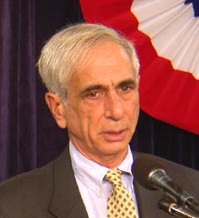Absentee voters,in general, tend to be more upscale and therefore likely to be more Republican. On the other hand, the bulk of the absentees is in the West Coast and particularly in California, and that tends to be a little more liberal. So we don't know.

"Curtis Gans" is an American activist, writer, and expert on American voting patterns past and present.
With Allard K. Lowenstein, Gans in 1967 started and headed the Dump Johnson movement. Based on opposition to the Vietnam War, the movement, which was considered quixotic at first, grew strong and was instrumental in setting in motion events which eventually persuaded president Lyndon Johnson that continuing his campaign to be re-nominated for the presidency by his party would be difficult and divisive and uncertain of success. Johnson withdrew his candidacy, an unusual event in American politics for a sitting president.
Gans has studied turnout and voting patterns for more than three decades. He co-founded and is director of the Center for the Study of the American Electorate, formerly housed at American University in Washington, D. C. Gans is commonly sought out by major American publications as an expert on voting patterns and is sometimes called on by the US State Department's Foreign Press Center to brief foreign reporters during the runup to American elections.
Additionally, he has served as a consultant to the Woodrow Wilson Center for International Scholars, the National Committee for an Effective Congress, and has managed a number of political campaigns.
More Curtis Gans on Wikipedia.Some of the battleground states, particularly those with other high-profile elections -- Florida, Michigan, Missouri and Washington -- may have higher turnout. But since about 33 states and the District of Columbia were not targeted by the campaigns, it is likely that turnout will fall in most of those states.
There are 1.1 million outstanding in California, absentees that haven't been counted, (and) 900,000 that haven't been counted in Washington.
The only good thing that can be said about mail voting is it's cheaper.
The likelihood is that this election will not be like 1996, when every state had lower turnout.
Copyright © 2024 Electric Goat Media. All Rights Reserved.